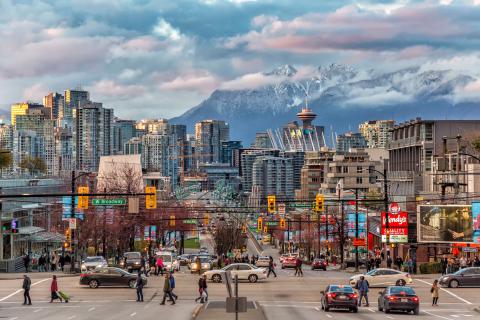Four years, six months and seven days ago I touched down on Canadian soil from the UK for the very first time. Standing in a three-hour queue at immigration after some tough goodbyes and a 13-hour journey alone across the Atlantic, it slowly dawned on me that the hard part may not be entirely over.
With no overseas phone contract, a mere £200 in a bank account I couldn’t access, no adaptors for my electronics and no Canadian money at all, I was concerned. Curled up in a hostel by the Pacific Ocean that night, I watched my laptop and phone die with no way of charging them, cried into a no-soap shower, crawled up to my bunk in a mixed 15-bed dormitory, tied my backpack to my foot and went to sleep. Welcome to Canada, Heidi.
Despite the shaky start, I hope it goes without saying that studying abroad was the most incredible, life-changing experience and that I would recommend it to anyone in a heartbeat. But settling in was never going to be easy.
However, once I did, the following four years were full of amazing memories including beach parties, hiking, cycling, surfing and skiing, road trips to Calgary and Seattle and dancing to late-night street musicians in Montreal. Some say these are the best years of your life, but I can’t emphasise strongly enough that the fun began after I took some time to settle in. So if you’re 18 and intrigued by the idea of studying abroad, I have some tips for you.
Please don’t overlook things like visas, phone contracts, bank accounts and health insurance. You’re going to want to start early, read all the documents and reach out to your university for advice.
If, like me, your first visa is rejected (I didn’t realise the importance of trudging down to London to get biometrics taken), just know that you’ll be declaring it at every point of entry for the next five years. I’d also advise you to look into transfer credits, majors, minors, course fees, GPAs, find the “add/drop deadline” and become an expert in all these things.
I suppose some financial awareness also wouldn’t go amiss. My first scholarship cheque couldn’t be deposited without a Canadian bank account, for which there was a two-week delay. I recommend triple-checking the overseas policy for your current bank account at home, arriving in Canada with an emergency supply of Canadian dollars and setting up that Canadian account ASAP.
I banked with various institutions during my studies: RBC, Wise, Vancity, BMO. However, Scotiabank brings home the trophy for my most highly recommended, with a fantastic rewards system, generous credit limit, many walk-in branches (where I advise you to set up the account), compatibility with online shopping (you can imagine my horror when I discovered that the RBC card doesn’t have a CVV) and partnership with Barclays as part of their Global ATM Alliance. There was also a $100 signing incentive, which absolutely didn’t hurt.
Aside from the fundamentals, the hardest part of settling in was the culture shock. Now, with a BA in anthropology, I am embarrassed to say that I didn’t have much cultural or political awareness at all when I turned up back in 2019.
In fact, I remember hearing my first land acknowledgement at “Jumpstart” (Freshers or Orientation Week) and going back to my room to google what it meant to be on traditional, ancestral, unceded territory and why my peers knew a history of my country that I hadn’t really been told.
Being British in Canada was a bit like turning up to a school lunch; people want to sit with you but you get the sense that everyone was just talking about you behind your back. Please do some research into the place you’re about to make your home and understand the history you represent.
Finally, have the courage to get it wrong. Nothing prepared me for the intensity of frat parties and it might take you a while to realise that you have to push the doors on public buses and that online shopping is a minefield until you realise that “$” is sometimes for USD not CAD…and look forward to paying international shipping too.
Distance takes its (famously expensive) toll and the hardest part will be when things go wrong and there’s nobody to call. If you want advice from a family member, you’d better hope your crisis arises at a sociable time back home. Spoiler: it never does.
You’re independent enough to do it alone, I know, but I advise you to build a community as soon as possible. And remember that nobody does it alone. You never know when you’ll need help while you’re so far away from your family, so making friends and building a community is one of the best ways to make the most of your study abroad journey.
It’s a roller-coaster, but this is your roller-coaster. So hold on tight.

Comments